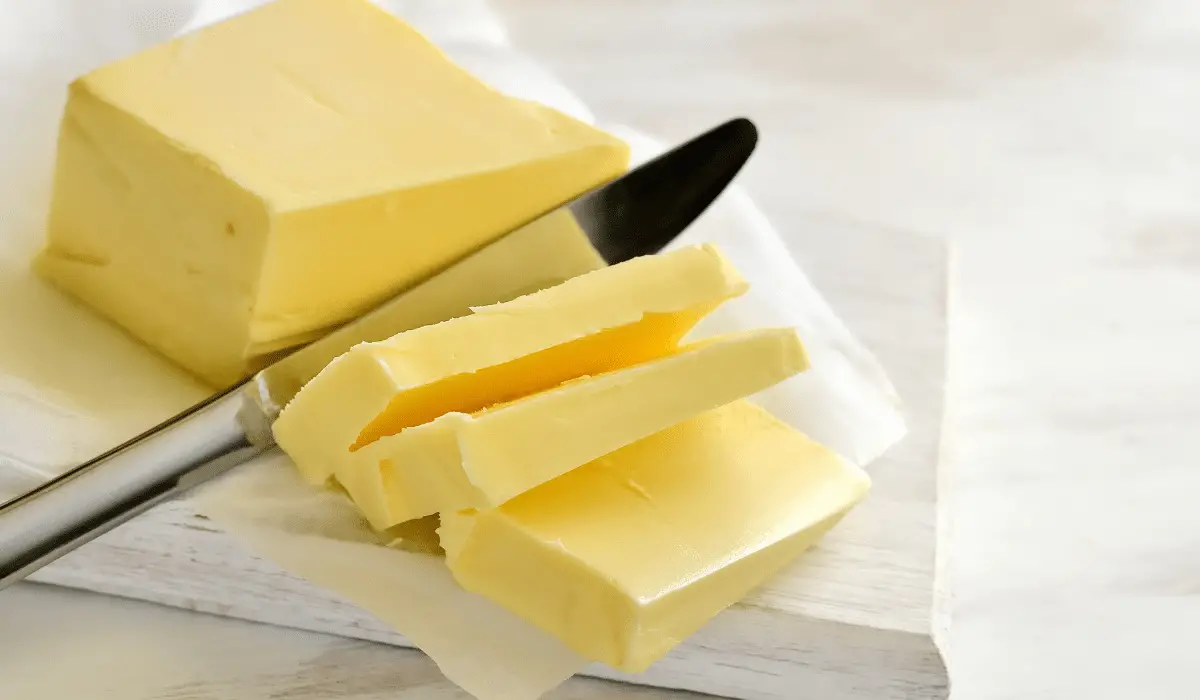Butter Basics: Composition and Production
What is Butter? An In-Depth Look
Butter, a staple in many kitchens, is a dairy product known for its rich flavor and creamy texture. It’s made from the fats of milk, primarily cow’s milk. When pondering, “Can vegetarians eat butter?”, it’s crucial to understand its origins. Butter’s journey begins with the churning of cream, separating fat from the liquid, resulting in this familiar spread.
The Process of Butter Making
Turning cream into butter is a fascinating transformation. It starts with the agitation of cream, a process that disrupts the fat molecules. As they clump together, butter begins to form. This physical change, from liquid to semi-solid, results in the creation of butter and buttermilk – a byproduct of the process.
The question “Can vegetarians eat butter?” centers around its animal-based origin. While vegetarians might include it as a rich source of fat, some may opt for alternatives due to ethical concerns or dietary preferences. This understanding is crucial in aligning dietary choices with personal values.
In conclusion, butter’s composition and production are simple yet intriguing. Its presence in vegetarian diets depends on individual choices and ethical considerations. Transitioning to or from butter consumption should be an informed decision, reflecting one’s dietary ethics and needs.
Can Vegetarians Eat Butter? Dietary Considerations Explored
Nutritional Aspects of Butter in a Vegetarian Diet
“Can vegetarians eat butter?” is a question that often surfaces in dietary discussions. In the realm of vegetarian nutrition, butter holds a unique place. As a dairy product, it’s naturally loaded with fats, primarily saturated. These fats play a critical role in energy provision and the absorption of fat-soluble vitamins like A, D, E, and K. For lacto-vegetarians, who include dairy in their diet, butter can serve as a source of these essential nutrients. However, it’s vital to consider its high-calorie profile and moderate consumption.
For a deeper understanding and more detailed information on this topic, I highly recommend exploring : Vegetarian Soup Dumplings: Healthy, Delicious Recipe & Discovering Vegetarian Tamales: A Flavorful Journey
Health Implications of Consuming Butter
Turning to the health implications, butter consumption requires a balanced approach. Despite its nutritional benefits, the high saturated fat content in butter raises concerns. Overconsumption can lead to increased cholesterol levels, posing risks for heart health. Vegetarians leaning towards butter must balance it with a diet rich in fruits, vegetables, and whole grains. This ensures a comprehensive nutrient intake without overloading on saturated fats.
In conclusion, the answer to “Can vegetarians eat butter?” is nuanced. It depends on individual dietary choices within the vegetarian spectrum. While lacto-vegetarians might include it for its nutritional value, health-conscious vegetarians should consume it judiciously, considering its impact on heart health and cholesterol levels.
Ethical and Environmental Concerns: Can Vegetarians Eat Butter?
Ethical Considerations in Dairy Production
When pondering “Can vegetarians eat butter?”, ethical considerations are paramount. Dairy farming, central to butter production, often faces scrutiny. Key concerns include animal welfare and the humane treatment of cows. Ethical vegetarians evaluate these factors critically, seeking transparency in dairy practices. They weigh the moral implications of supporting an industry that may not align with their values of compassion and animal rights.
Environmental Impact of Butter Production
Moreover, the environmental footprint of butter production is a critical aspect. Dairy farming demands significant resources: land, water, and feed. It also contributes to greenhouse gas emissions, a leading cause of climate change. Thoughtful vegetarians consider these environmental aspects when deciding whether to include butter in their diet. They often seek eco-friendly alternatives that lessen their ecological impact.
In essence, the decision “Can vegetarians eat butter?” involves a complex interplay of ethical and environmental considerations. Vegetarians must navigate these aspects, balancing personal ethics with environmental consciousness. Transitioning towards sustainable and humane options can be a meaningful step for those committed to making a positive impact.
Alternatives to Traditional Butter
Plant-Based Butter: A Viable Option?
When pondering the question, “Can vegetarians eat butter?”, many consider plant-based butter as a promising alternative. These vegan-friendly spreads, crafted from oils like coconut, almond, or soy, offer a similar taste and texture to traditional butter without any dairy involvement. They’re a staple in vegan cuisine and have gained popularity among vegetarians seeking dairy-free options.
Transitioning to plant-based butter aligns with the growing trend of sustainable and ethical food choices. These alternatives often boast a lower environmental footprint and sidestep the ethical dilemmas associated with dairy farming. Plus, they cater to those with lactose intolerance, widening their appeal.
Healthier Butter Alternatives for Vegetarians
For vegetarians grappling with the “Can vegetarians eat butter?” dilemma, health is a significant factor. Traditional butter, rich in saturated fats, demands moderation. Here, plant-based butters shine, offering healthier fats like omega-3 fatty acids, found in options like avocado or olive oil-based spreads.
These alternatives not only reduce the intake of animal-derived fats but also contribute beneficial nutrients. They often include added vitamins and minerals, aligning well with a vegetarian’s nutritional goals. Margarine made from vegetable oils, though once frowned upon due to trans fats, now presents healthier formulations free from these harmful components.
In summary, vegetarians exploring butter alternatives have an array of choices. Plant-based butters offer a blend of taste, health benefits, and ethical satisfaction, answering the “Can vegetarians eat butter?” question with delicious and nutritious options.
Lacto-Vegetarianism: A Closer Look
Defining Lacto-Vegetarianism
Lacto-vegetarianism represents a unique approach within the vegetarian spectrum. Individuals following this diet embrace dairy products while strictly avoiding meat, poultry, and eggs. This distinct dietary choice often raises the question, “Can vegetarians eat butter?” The answer lies in understanding the core principles of lacto-vegetarianism.
How Lacto-Vegetarians Approach Dairy Products
Lacto-vegetarians, unlike vegans, include dairy in their diet. This inclusion extends to butter, cheese, and milk, considering these products as acceptable vegetarian options. The decision to consume dairy, including butter, stems from a balanced perspective on nutrition and ethical sourcing. Lacto-vegetarians typically prioritize organic and ethically produced dairy products, aligning with their broader ethical stance on animal welfare.
For lacto-vegetarians, butter is not just a culinary ingredient; it’s a source of essential nutrients like calcium and vitamin D. Including butter in their diet, lacto-vegetarians enjoy the richness it adds to their meals, ranging from sautéed vegetables to baked goods.
Transitioning to lacto-vegetarianism involves understanding dairy’s role in a balanced diet. It’s about making informed choices, where “Can vegetarians eat butter?” becomes a question of personal dietary ethics and health preferences. In conclusion, lacto-vegetarianism offers a middle ground for those seeking to balance vegetarian principles with the nutritional benefits of dairy, including the consumption of butter.
Butter in Culinary Practices: Elevating Vegetarian Cooking
The Versatile Role of Butter in Vegetarian Dishes
Can vegetarians eat butter? Absolutely, and it’s a game-changer in vegetarian cuisine. Butter, with its rich, creamy texture, transforms the simplest ingredients into delectable dishes. It’s not just about adding flavor; it’s about creating a culinary experience. In vegetarian cooking, butter plays a pivotal role, whether it’s in sautéing vegetables or crafting mouth-watering sauces.
Creative Butter-Infused Vegetarian Recipes
Imagine savoring a dish where butter is the star. Vegetarian recipes often rely on natural flavors, and butter enhances these beautifully. Consider a butternut squash risotto, where a dollop of butter melds with Arborio rice, releasing a creamy, luxurious texture. Or picture a classic grilled cheese, where butter crisps the bread to golden perfection, complementing the melted cheese inside.
Moreover, butter isn’t just for savory treats. It’s essential in baking too. From flaky, buttery pastries to moist cakes, butter’s richness is unmatched. Vegetarian desserts like apple crumble or blueberry muffins reach new heights of deliciousness with butter’s golden touch.
Conclusion: Butter, A Vegetarian Culinary Delight
So, can vegetarians eat butter? The answer is a resounding yes, and the culinary world is all the richer for it. Butter’s versatility in vegetarian cooking—from savory main courses to sweet desserts—proves its indispensable role. It’s not just an ingredient; it’s a celebration of flavor, making every vegetarian dish a memorable feast.
Can Vegetarians Eat Butter? A Comprehensive Analysis
Summarizing Key Points
When addressing “Can vegetarians eat butter?”, it’s essential to delve into the heart of vegetarianism. Vegetarians often avoid meat for ethical, health, or environmental reasons. Butter, however, falls into a gray area. Derived from milk, it raises questions about animal welfare and dietary choices.
Butter’s role in a vegetarian diet isn’t black and white. Some vegetarians, especially those following a lacto-vegetarian diet, include butter, embracing its rich flavor and nutritional value. Others, leaning towards a stricter interpretation of vegetarianism, may exclude it due to concerns over animal welfare or the environmental impact of dairy farming.
The debate around “Can vegetarians eat butter?” also touches on health aspects. Butter is a source of saturated fats, and while it can be part of a balanced diet, moderation is key. Plant-based butter alternatives offer a solution for those seeking to avoid animal products while still enjoying a butter-like experience.
Final Thoughts on Butter and Vegetarianism
In concluding this exploration, it’s clear that the question “Can vegetarians eat butter?” does not have a one-size-fits-all answer. It hinges on individual beliefs, dietary preferences, and ethical considerations. Whether to include butter in a vegetarian diet is a personal choice, reflecting a balance between culinary enjoyment, health consciousness, and ethical considerations.
Vegetarians pondering this question must weigh their options, considering both the nutritional implications and the ethical dimensions of butter consumption. As the dialogue around vegetarian diets continues to evolve, so will perspectives on including dairy products like butter. Ultimately, the decision rests with the individual, guided by their values and dietary goals.
Discover more culinary delights by checking out How do you eat crab legs? & Why is Crab So Expensive? An Insight into the Delicacy’s High Cost


2 thoughts on “Can Vegetarians Eat Butter?”
Comments are closed.